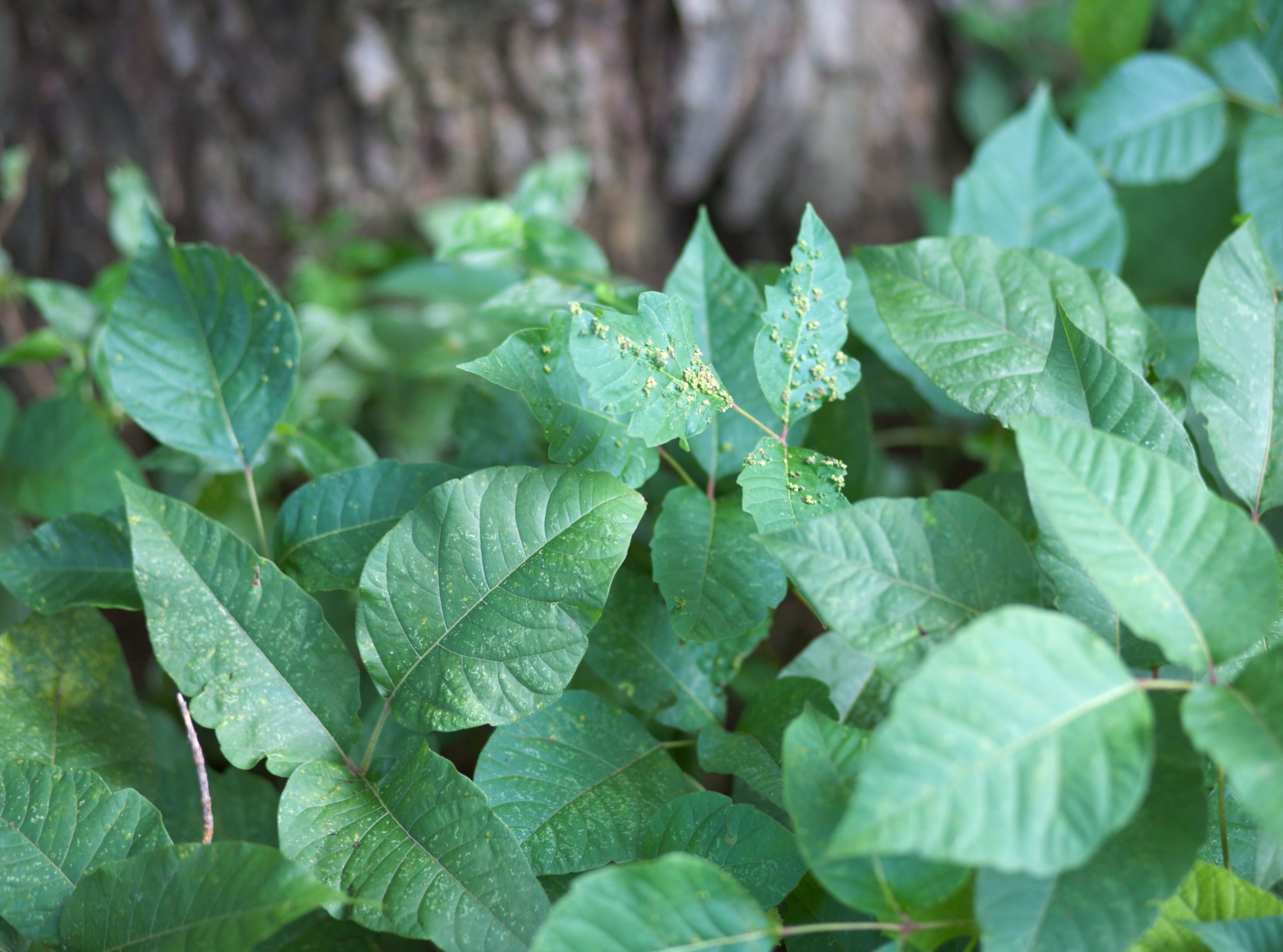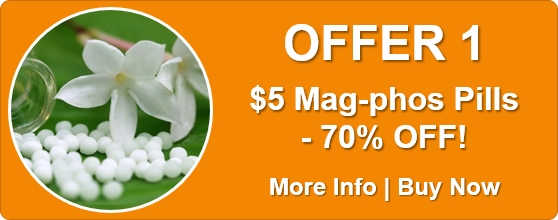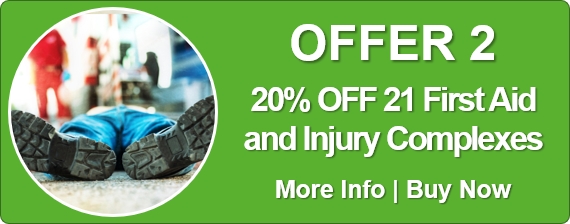Boericke on Rhus Toxicodendron (Rhus-t.)
 Rhus Toxicodendron (Poison Ivy)
Rhus Toxicodendron (Poison Ivy)
The effects on the skin, rheumatic pains, mucous membrane affections, and a typhoid type of fever, make this remedy frequently indicated. Rhus affects fibrous tissue markedly-joints, tendons, sheaths-aponeurosis, etc, producing pains and stiffness. Post-operative complications. Tearing asunder pains. Motion always “limbers up” the Rhus patient, and hence he feels better for a time from a change of position. Ailments from strains, overlifting, getting wet while perspiring. Septic conditions. Cellulitis and infections, carbuncles in early stages (Echinac). Rheumatism in the cold season. Septicćmia.
Mind.–Listless, sad. Thoughts of suicide. Extreme restlessness, with continued change of position. Delirium, with fear of being poisoned (Hyos). Sensorium becomes cloudy. Great apprehension at night, cannot remain in bed.
Head.–Feels as if a board were strapped on the forehead. Vertigo when rising. Heavy head. Brain feels loose and as if struck against skull on walking or rising. Scalp sensitive; worse on side lain on. Headache in occiput (Rhus rad); painful to touch. Pain in forehead and proceeds thence backward. Humid eruptions on scalp; itching greatly.
Eyes.–Swollen, red, śdematous; orbital cellulitis. Pustular inflammations. Photophobia; profuse flow of yellow pus. Śdema of lids, suppurative iritis. Lids inflamed, agglutinated swollen. Old injured eyes. Circumscribed corneal injection. Intensive ulceration of the cornea. Iritis, after exposure to cold and dampness, and of rheumatic origin. Eye painful on turning it or pressing, can hardly move it, as in acute retrobulbar neuritis. Profuse gush of hot, scalding tears upon opening lids.
Ears.–Pain in ears, with sensation as if something were in them. Lobules swollen. Discharge of bloody pus.
Nose.–Sneezing; coryza from getting wet. Tip of nose red, sore, ulcerated. Swelling of nose. Nosebleed on stooping.
Face.–Jaws crack when chewing. Easy dislocation of jaw (Ign; Petrol). Swollen face, erysipelas. Cheek bones sensitive to touch. Parotitis. Facial neuralgia, with chilliness; worse, evening. Crusta lactea (Calc; Viol tric).
Mouth.–Teeth feel loose and long; gums sore. Tongue red and cracked; coated, except red triangular space at the tip; dry and red at edges. Corners of mouth ulcerated; fever-blisters around mouth and chin (Nat mur). Pain in maxillary joint.
Throat.–Sore, with swollen glands. Sticking pain on swallowing. Parotitis; left side.
Stomach.–Want of appetite for any kind of food, with unquenchable thirst. Bitter taste (Cupr). Nausea, vertigo, and bloated abdomen after eating. Desire for milk. Great thirst, with dry mouth and throat. Pressure as from a stone. (Bry; Ars) Drowsy after eating.
Abdomen.–Violent pains, relieved by lying on abdomen. Swelling of inguinal glands. Pain in region of ascending colon. Colic, compelling to walk bent. Excessive distention after eating. Rumbling of flatus on first rising, but disappears with continued motion.
Rectum.–Diarrhśa of blood, slime, and reddish mucus. Dysentery, with tearing pains down thighs. Stools of cadaverous odor. Frothy, painless stools. Will often abort a beginning suppurative process near the rectum. Dysentery.
Urinary.–Dark, turbid, high-colored, scanty urine, with white sediment. Dysuria, with loss of blood.
Male.–Swelling of glands and prepuce-dark-red erysipelatous; scrotum thick, swollen, śdematous. Itching intense.
Female.–Swelling, with intense itching of vulva. Pelvic articulations stiff when beginning to move. Menses early, profuse, and prolonged, acrid. Lochia thin, protracted, offensive diminished (Puls; Secale), with shooting upwards in vagina (Sep).
Respiratory.–Tickling behind upper sternum. Dry, teasing cough from midnight until morning, during a chill, or when putting hands out of bed. Hćmoptysis from overexertion; blood bright red. Influenza, with aching in all bones (Eup perf). Hoarseness from overtraining voice (Arn). Oppression of the chest, cannot get breath with sticking pains. Bronchial coughs in old people, worse on awaking and with expectoration of small plugs of mucus.
Heart.–Hypertrophy from overexertion. Pulse quick, weak, irregular, intermittent, with numbness of left arm. Trembling and palpitation when sitting still.
Back.–Pain between shoulders on swallowing. Pain and stiffness in small of back; better, motion, or lying on something hard; worse, while sitting. Stiffness of the nape of the neck.
Extremities.–Hot, painful swelling of joints. Pains tearing in tendons, ligaments, and fascić. Rheumatic pains spread over a large surface at nape of neck, loins, and extremities; better motion (Agaric). Soreness of condyles of bones. Limbs stiff paralyzed. The cold fresh air is not tolerated; it makes the skin painful. Pain along ulnar nerve. Tearing down thighs. Sciatica; worse, cold, damp weather, at night. Numbness and formication, after overwork and exposure. Paralysis; trembling after exertion. Tenderness about knee-joint. Loss of power in forearm and fingers; crawling sensation in the tips of fingers. Tingling in feet.
Fever.–Adynamic; restless, trembling. Typhoid; tongue dry and brown; sordes; bowels loose; great restlessness. Intermittent; chill, with dry cough and restlessness. During heat, urticaria. Hydroa. Chilly, as if cold water were poured over him, followed by heat and inclination to stretch the limbs.
Skin.–Red, swollen; itching intense. Vesicles, herpes; urticaria; pemphigus; erysipelas; vesicular suppurative forms. Glands swollen. Cellulitis. Burning eczematous eruptions with tendency to scale formation.
Sleep.–Dreams of great exertion. Heavy sleep, as from stupor. Sleepless before midnight.
Modalities.–Worse, during sleep, cold, wet rainy weather and after rain; at night, during rest, drenching, when lying on back or right side. Better, warm, dry weather, motion; walking, change of position, rubbing, warm applications, from stretching out limbs.
Relationship.–Complementary: Bry; Calc fluor. Phytol (Rheumatism). In urticaria follow with Bovista.
Inimical: Apis.
Antidotes: Bathing with milk and Grindelia lotion very effective. Ampelopsis Trifolia-Three-leaf Woodbine–(Toxic dermatitis due to vegetable poisons-30 and 200. Very similar to Rhus poisoning). Desensitizing against Ivy poisoning by the use of descending doses of the tincture by mouth or by hypodermic injections is recommended by old school authorities, but is not as effective as the homeopathic remedies especially Rhus 30 and 200 and Anacard, etc. Anacard; Croton; Grindelia; Mezer; Cyprip; Plumbago (eczema of vulva); Graph.
Compare: Rhus radicans (almost identical action); characteristics are, burning in tongue, tip feels sore, pains are often semilateral and in various parts, often remote and successive. Many symptoms are better after a storm has thoroughly set in, especially after an electric storm. Has pronounced yearly aggravation (Laches). Rhus radicans has headache in occiput even pain in nape of neck and from there pains draw over the head forwards. Rhus diversiloba-California Poison-oak (antidote to Rhus; violent skin symptoms, with frightful itching; much swelling of face, hands and genitals; skin very sensitive; eczema and erysipelas, great nervous weakness, tired from least effort; goes to sleep from sheer exhaustion); Xerophyllum (dysmenorrhśa and skin symptoms). Compare, also; Arn; Bapt; Lach; Ars; Hyos; Op (stupefaction more profound). Mimosa-Sensitive Plant–(rheumatism, knee stiff, lancinating pains in back and limbs. Swelling of ankles Legs tremble).
Dose.–Sixth to thirtieth potency. The 200th and higher are antidotal to poisoning with the plant and tincture.
(Extracted from Materia Medica by William Boericke MD (1901). This materia medica is a condensed and concise list of remedy symptoms from provings and clinical usage. Later editions include a repertory at the back of the book. The focus of this materia medica, unlike some modern materia medicas, is on physical symptoms and pathology more than mental-emotional symptoms)






